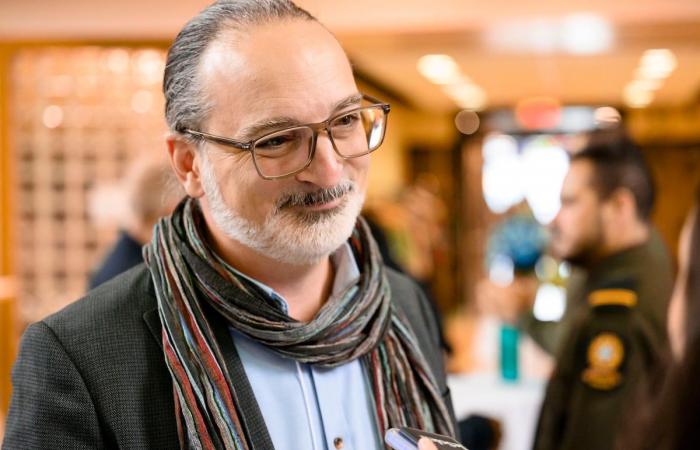Jean-François Beaulieu is assistant to the mental health and dependency department of the CIUSSS de la Capitale-Nationale. He knows the University Institute of Mental Health of Quebec (IUMSQ) like the back of his hand.
The Sun was able to visit this institution rich in history on Monday, as part of the very first partner day of the CIUSSS de la Capitale-Nationale. For the occasion, around 300 speakers and around fifty organizations gathered to discuss various issues.
Acting as guide for the day, Jean-François Beaulieu conveys an obvious passion for mental health. A subject which, according to him, has too bad a reputation. “I don’t think there are any more mental health issues. I think we are more open to talking about it,” he says straight away.
Jean-François Beaulieu is assistant to the mental health and dependency department of the CIUSSS de la Capitale-Nationale. (Victoria Baril/The Sun)
Predictable
According to the assistant director, statistics regarding serious mental disorders do not vary as much as one might think. “Every year, we know how many we are going to have. There are a lot of growing phenomena, but in terms of the total number, we don’t believe that it has changed that much.”
Yes, citizens consult more, agrees Mr. Beaulieu. But it’s good news. “There is something beautiful about people consulting. For us, it doesn’t matter that there are 1,600 emergency consultations. What’s a shame is that they have to go to the emergency room to get their services.”
Men consult less
Even though the suicide rate is decreasing, men aged 45 and over remain over-represented in the CIUSSS de la Capitale-Nationale statistics. They represent approximately 75% of people who end their lives each year.
However, girls aged 12-25 are those who consult the most for suicidal ideas. According to Jean-François Beaulieu, these findings demonstrate that there is still a lot of work to be done to convince men to consult.
Around 300 speakers and around fifty organizations gathered to discuss various issues. (Jocelyn Riendeau/The Sun)
“The most important factor is comparison on social media. I’m not beautiful enough, not advanced enough in life…young people are in this a lot, a lot subject to this social pressure. And they experience a lot of anxiety.”
Even if they talk about it less, boys are also affected by social networks. “Eating disorders are now almost as serious in men as in women,” he says.
Lack of resources?
Despite the large quantity of services offered, access to health care remains difficult, agrees Mr. Beaulieu.
“I think people never know where to go,” he emphasizes. If in doubt, he recommends that citizens call 811. “Are you going to have service within 24 hours? If it’s urgent, yes. But if it is less urgent, in a month, you will have one,” assures Jean-François Beaulieu.
According to Frédéric Keck, Assistant Director of Mental Health and Addictions Programs, the shortage of resources is a constant issue for all organizations. “Afterwards, it is to see how we reorganize ourselves and manage to still meet the needs of the population, despite these challenges.”

Frédéric Keck is assistant to the Directorate of Mental Health and Addictions Programs. (Jocelyn Riendeau/The Sun)
According to him, moments of exchange such as the partners’ day allow us to “better understand who can be called upon, in what situation” to improve the services offered to the population.
“It’s no longer Robert Giffard”
Monday’s activity also aimed to introduce the University Institute of Mental Health of Quebec to stakeholders working in the field. Many still associate it with its former name, the Robert-Giffard Hospital Center.
“People still see the psychiatric hospital a little. It’s true. The University Mental Health Institute is a psychiatric hospital. But it’s just a portion of the service offering that is provided here internally,” maintains Frédérick Keck.
In addition, the institute is more accessible than before. “It’s an establishment that is a little more open to the community than it was, for example, in the 90s.”
Since 1960, the number of beds has greatly decreased. The CIUSSS de la Capitale-Nationale is trying to reduce hospitalizations as much as possible. “It’s the last resort, because it’s still a trauma to be hospitalized in psychiatry,” argues Jean-François Beaulieu.
WHAT ABOUT HOMELESSNESS?
Through the discourse on mental health, Jean-François Beaulieu particularly deplores associations that are too rapid. “Homelessness is clearly growing. But it’s a phenomenon, it’s not a mental health problem,” he adds.
Not everyone who is homeless develops a mental health disorder or addiction. However, several circumstances increase the risks.
Frédéric Keck has seen this throughout his career. “Periods of stress cause us to consume more and become more vulnerable. A spell on the street is a period of stress the likes of which we rarely see. There is an emergence of mental health and addiction issues,” he agrees.
The two men remind us that homelessness “is not a choice”, especially with the “tremendous” increase in rents.








